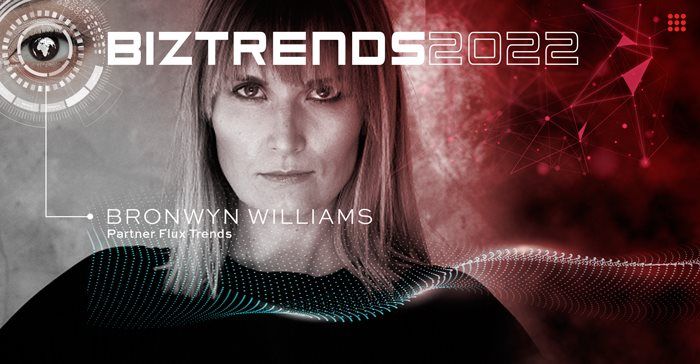Marketing & Media trends
Industry trends
BizTrends Sponsors
Subscribe & Follow
Trending
#BizTrends2022: Game players - the gig workers of the future?

This was the message of futurist and economist, Bronwyn Williams of Flux Trends, whose insights at this year’s online #BizTrends2022 event highlighted the metaverse as the virtual office of the future.
BizTrends 02.02.2022 featured over 150 contributions from 19 business-to-business community sectors, culminating in the annual event, which this year saw seven leading trend analysts take to the virtual stage.
Putting a price tag on the intangible
“There is a mission we’re moving towards called WebDream, which is a combination of virtual reality, digital technologies, blockchain technology, and DeFi (decentralised finance). And all that Next Wave Technology is combining to commoditise things that were formerly free for families, individuals and communities who collectively had access to an abundance of free information that was previously funded by advertising,” Williams said.
“More and more of these interactions - that were previously free or done by a willing seller without money being involved - are now being replaced by micro payments.
“The idea of every interaction we do being quantified and then also being given a price could be seen as hugely exciting for certain brands of businesses, but it could also be seen as perhaps slightly dystopian, because we’re talking about quantifying and commodifying not just the business relationship or business transactions, but also transactions that are done on a human-to-human basis out of kindness or even love.”
Selling her soul
Williams used pop singer Grimes - the mother of Elon Musk’s son - as an example. Grimes is said to have put a piece of her soul up for sale as part of a fine-art project. At first Grimes put the price on her soul at $10m and then later put it out to the highest bidder, drawing up legal papers for the exchange of the "art".
The highest auction bid was $16m.
Grimes is quoted in the NZ Herald as saying "The idea of fantastical art in the form of legal documents just seems very intriguing to me."
In March 2021 she received $5.8m in exchange for selling a suite of her artworks in the form of NFTs.
The digital artworks were published as "WarNymph Collection Vol 1,"and launched via tweet to her 1.1 million followers.
“The biggest wins in this decentralised creative movement have tended to be by people who already have some fame, status or clout that they can launder into physical cash,” Wiliams said.
But not all who enter the Metaverse are necessarily famous.
Play-to-earn games
Williams spoke about Playing to Earn gaming.
“This is where people are monetising the time they spend in games like Fortnite, or on games like Axie Infinity. Axie Infinity is a new type of game, partially owned and operated by its players. It's an NFT type training game where new players have to buy characters like little monsters from existing players. Existing players then breed those little monsters to get more little monsters to sell to new players," Williams says.
You can build up a collection of these 'Axies' and use them across an ever-expanding universe of games.

"Some people in the Philippines found themselves underemployed or unemployed during Covid. They were able to supplement and sometimes even supercede the amount of money they were able to earn by "working" in the real world by engaging in Axie Infinity," said Williams. "In other words, unproductive labour - labour spent literally playing games - was able to make individual workers more money than if they were engaging in productive work delivering real goods and services.”
To date, $3.6bn has been traded in-house on Axie Infinity. there are 2.8 million players. The most expensive Axie ever sold was $820,000.
"This is quite a pivotal shift and it does bring up that question of where we are heading in terms of the future world of work. Many of us do work for the sake of doing work; we find ourselves stuck on this treadmill where we have to participate in these paid-to-win systems and economies, that have been set out around us.
“When you juxtapose this against the existence of 'meaningless' or intangible jobs on the Internet, what's actually preferable? Make Work to Work that gets people running on these treadmills or giving people a universal basic income so they can have a decent life without having to do performative type work?”
Beware the pitfalls
While game players could be the gig workers of the future, brands should be mindful that sometimes it’s not always all fun and games in the metaverse.
"If we do get involved in these spaces, we have to do our homework and understand what can go wrong, what our rights and responsibilities are, and what the increasingly liabilities are if we are going to take advantage of them and something goes wrong," Williams says.
“Looking ahead, we can see the unreal economy imitating the “real” one, as DeFi (decentralised finance) begins to dabble in its own version of collateralised debt obligations – with all the leverage risks that come with that.

“With Axie Infinity. we quickly saw that as more players joined the game, the price of the little monsters you had to buy - in order to buy into the game - got more expensive. This got to the point that players started creating guilds that would buy the monsters on behalf of the players and then loan them out to players for those players to continually play. This gets them onto a debt treadmill.”
Watch your back, because once you’re sucked in you may not be able to get out.
“This is now at the point where players are considering unionising against the games they are effectively working for,” Williams said.
Do your homework
“Also know that once in the metaverse, you will be manipulated into buying more goods and services you don’t actually need,” Williams warned.
She says Facebook has filed a patent for technology that tracks your facial expressions and emotional cues in response to goods and services in the Metaverse, with the idea of selling you more of the goods you respond favourably to.
To this end, Lexus has a micro-site featuring just such an example of an emotionally adaptive advertisement.

As the viewer engages with the AI, the advertisement responds accordingly with visual and musical changes to the content depending on the viewer’s perceived emotional state.
Each “scan point” along the storyline triggers a different edit from the AI, combining campaign material and hand-selected footage approved by a panel of psychologists. This can result in as much as 3,125 possible combinations.
This ties in with Williams concept of semi-surreality tunnels, where customers are guided down their own customised virtual garden path in order to buy a product at the end of that journey.
"It takes the idea of personalised, micro-managed marketing to the endth degree,” she says.
With great power comes great responsibility
“This is just to illustrate the point that sometimes you're not sure of what it is you're owning or getting into,” Williams said. “So from a brand and business perspective we have to start to understand that as we get into these new ways of monetising things that formerly couldn't be monetised, there are new people and technical challenges that we are going to have to come to terms with.
"These things are neither black or white, right or wrong, good or bad, rather they are opportunities that we have to approach business in ways that are win-win for both ourselves and for our customers."
"It's also something to think about as a brand and as an individual: “What are you doing in terms of good or ill when you are taking advantage of the great powers of these technologies - to not just nudge people towards your product but the goods and services you want to sell? This is because you're not just changing their emotional connection to your brand, but their emotional connection to the world at large."
Bronwyn Williams is a partner at Flux Trends executive consultancy, and is an influential future thinker, trend translator, future finance specialist, business trend analyst, author, academic, columnist and media personality. Follow @bronwynwilliams @fluxtrends















